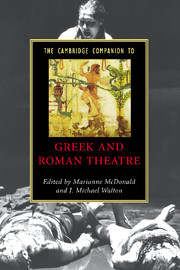Book contents
- Frontmatter
- Introduction
- PART I: TEXT IN CONTEXT
- 1 ‘Telling the tale’: a performing tradition from Homer to pantomime
- 2 Ancient theatre and performance culture
- 3 Religion and drama
- 4 The socio-political dimension of ancient tragedy
- 5 Aristotle’s Poetics and ancient dramatic theory
- 6 Politics and Aristophanes: watchword ‘Caution!’
- 7 Comedy and society from Menander to Terence
- 8 Lost theatre and performance traditions in Greece and Italy
- PART II: THE NATURE OF PERFORMANCE
- Playwrights and plays
- Glossary of Greek and Latin words and terms
- Select bibliography
- Index
5 - Aristotle’s Poetics and ancient dramatic theory
from PART I: - TEXT IN CONTEXT
Published online by Cambridge University Press: 28 January 2009
- Frontmatter
- Introduction
- PART I: TEXT IN CONTEXT
- 1 ‘Telling the tale’: a performing tradition from Homer to pantomime
- 2 Ancient theatre and performance culture
- 3 Religion and drama
- 4 The socio-political dimension of ancient tragedy
- 5 Aristotle’s Poetics and ancient dramatic theory
- 6 Politics and Aristophanes: watchword ‘Caution!’
- 7 Comedy and society from Menander to Terence
- 8 Lost theatre and performance traditions in Greece and Italy
- PART II: THE NATURE OF PERFORMANCE
- Playwrights and plays
- Glossary of Greek and Latin words and terms
- Select bibliography
- Index
Summary
Aristotle (384-322 BC) was the greatest polymath of antiquity, whose aim was to create a systematic science of everything. He wrote about social policy, personal morality, logic and cosmology, but is perhaps most impressive in the field of biology. For two millennia, no one would improve upon his applied research into the different forms of animal life. Amidst this huge intellectual output, we find at the end of his Collected Works a set of condensed lecture notes on poetry. Little read in antiquity, these notes would exercise a huge influence upon the Renaissance, and on later generations of playwrights. Known as the Poetics, the notes attempt to do two things: firstly, they compare tragedy to epic in order to argue that tragedy is the highest form of literary art, and secondly, they offer a guide to a would-be writer in how to write the best possible tragedy. Aristotle regards tragedy as a biological 'organism' (Poetics xxiii.1), and the way to study an organism is to see how its different bodily parts interrelate.
In recent years, film theorists have continued to study and admire the Poetics, because of the emphasis which Aristotle gives to narrative, described as the invisible 'soul' of the organism (vi.14). A Hollywood story analyst in 2002 published Aristotle's Poetics for Screenwriters: Storytelling Secrets from the Greatest Mind in Western Civilization as a guide for aspirant writers. Theorists of performance, however, have wanted to assert that 'liveness' differentiates theatre from cinema, and have often baulked at Aristotle's uncompromising view that the power of tragedy is the same with or without performance and the actors (vi.19).
- Type
- Chapter
- Information
- The Cambridge Companion to Greek and Roman Theatre , pp. 92 - 107Publisher: Cambridge University PressPrint publication year: 2007
- 4
- Cited by



